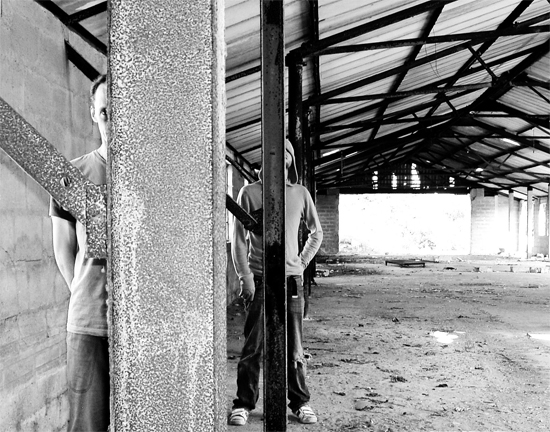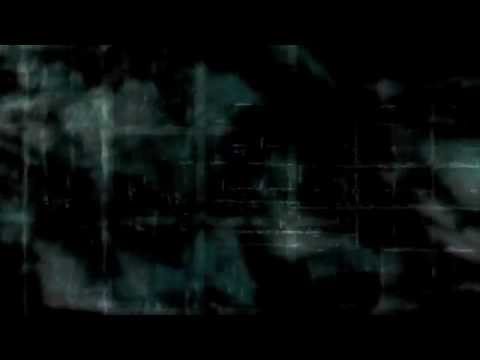On the YouTube video, a room full of men and women, black and white, Rasta and Gentile, shake in time with what’s clearly the massive bass of a reggae system, Jah Shaka at the helm. Yet the sound coming out of the laptop speakers is compressed, tinny and roaring, as if its cooling fan was about to come blasting through the keyboard and embed in your nose.
"A massive inspiration for Cloaks are Jah Shaka mixtapes," says Steve Harris, who has just Skyped the Quietus with the link to a Shaka party. "When he plays live through a stack it’s all very nice and bassy and reggaeish, but the tapes that he released, because they’re recorded on dictaphone, they’re really distorted."
The music of Norwich-based Cloaks, first heard on debut album Versus Grain and imminently to appear remixed by the likes of Ancient Methods, Dead Fader and Devilman on the snide Versions Grain compilation, is a marriage of industrial and dub that sounds like a bunch of robots riding a herd of DNA-regenerated mastodons into your garden hell-bent on fucking with the geraniums. Harris and Cloaks collaborator Carl Jordan first bonded over a love of dubstep after years of disagreement about music: "Carl was friends with my brother originally, we’d been friends for years and worked on lots of little projects together but I’d always been in indie bands and hip hop bands and he really hates hip hop and tries to avoid anything with guitars. He was an acid techno producer and he used to just make his stuff at home. Dubstep was the reason for Cloaks starting. I remember when I heard ‘What’ by DJ Wonder for the first time I viewed it in a different way from a lot of the dancefloor crowd because to me it just seemed bold, artistic, super-minimal, really fucking moody," Harris explains.
Yet he soon got disenchanted with where the genre was going: "It gradually got more and more for the ladies so you could fill dancefloors with it, and we got more and more bored. I think there was a period there in 2005, 2006 where I just bought every single 12" that you can describe as dubstep, and was obsessive about it, and started getting back into DJing. People criticised dubstep for it being hoods up and heads down, really heavy and moody and too masculine and not dancefloor enough. Every one of those descriptions are the reasons that I did like it, that it was meditative and like reggae but not as dancey, more extreme and harsher."
This frustration with the more mainstream inclinations of dubstep led Harris to Ben Frost’s Theory Of Machines, a record that led him to a whole new musical world: "It opened me up to other things like Pansonic that we got compared to who I had never heard before."
That’s what I especially hear.
SH: I think it’s the hardware, that’s the thing. With it being power electronics and it essentially being drum machines affected and processed and set up live, and they just run with it and tweak it as they go, and that’s how they create at least the basis of their tunes. That’s kind of what we do, even if we create in less of a live and more of a studio way, it’s similar.
I like that you call it Proactive Electronics.
SH: I wanted to be as open to anything as I could be, as far as the 3by3 label is concerned. I would totally sign something like Death Grips. They’re fucking unreal. Sige from Devilman, DJ Scotch Egg, he’s in Berlin working with Sensational who’s an MC who has done stuff with NHK and a load of other Berlin-based extreme electronic people, the kind of thing that they’re making is verging on Death Grips, extreme electronic music, extreme hip hop, though his rapping is obviously very different.
How do you feel Cloaks relates to dubstep now?
SH: Everything musically is post-dubstep: Britney Spears, rock music, indie bands, drum & bass, everything. It was such a fucking huge thing to music, especially in a time when the whole music industry was supposedly fucked there was this whole scene that was making lots of money. It’s essentially drum & bass all over again except with the internet to back it up so it just got huge really fucking quickly. Anybody that’s making slightly angry music, whether its guitar or electronic, because we’re in a post-dubstep world it is going to have to include a certain amount of it. That sounds a bit ridiculous, but maybe it’s not a coincidence, all these people are not listening to each other. There could be a resurgence of industrial too – if you think of the main rules and regulations of dubstep, essentially bass-heavy minimal music that’s half-time, really slow and drawn out, you make it in a lot of musical contexts and it could be construed as industrial if done in a certain way. I think our stuff has been misunderstood. I think when you hear that Cloaks are dubstep producers, the image that conjures in your mind of how that duo of people work and how they are as musicians and how experienced they are… You don’t get to a pair of 30 and 40 year old blokes in a hardware-based studio who’ve both been in bands for decades. Your instant thought when you hear dubstep producers is basically a kid with a laptop, no hardware, has never played instruments. So I feel some of the conscious artistic ideas we’re exploring get ignored.
*
Indeed, some of the early comparisons to Pansonic and other industrial-tinged groups were perplexing: "When Cloaks came out and people compared us to Godflesh or Scorn I was like, ‘Who?’ When I heard people like Vex’d making their dubstep stuff I was surprising you could get away with making music that bold and minimal and moody because I’d never heard any industrial or extreme metal before."
But after a well-received, mind-bending DJ set at last year’s Supersonic, and this weekend’s first Birmingham live appearance, it’s among fans of music from the fringes that Cloaks are finding their crepuscular beats and fizzing overpressure receive the warmest attention. "I felt totally honoured to get invited to play Supersonic, and it’s amazing that we’ve been invited to come back this year. I imagine it had a lot to do with Justin and Godflesh. The plan is for Justin to do an album for 3by3 under his JK Flesh name. I met him through Kevin Martin, we played with Kevin at a festival in Prague and he introduced Justin. Greymachine was the project that he was working on at the time. I think he suggested us to Supersonic. To play it and share a stage with Kev and Justin is exciting, and this year obviously we’re sharing a stage with Scorn. I’m really looking forward to it, it’s going to be me and Carl doing laptops and electronics. We had no idea that we’d have fans in that arena, but they’re some of those who get us the best."
Cloaks’ remix EP Versions Grain is out now. Cloaks play Supersonic this Friday



